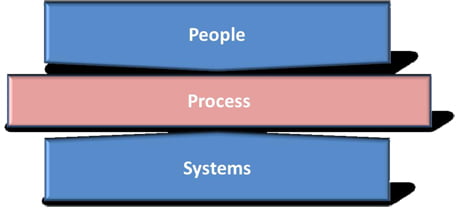We often hear companies say that people are their best asset. Those same companies have often invested a significant amount of resources in their maintenance information systems. Yet many of those companies are not seeing the desired results in terms of production, cost, availability and reliability. Why is it that the sum of good people and good systems does not always produce good performance?
The answer partly lies on the line between people and systems. This is where people interact with their established business systems, colliding in a way that either produces fruit or friction. Let’s define this line of interaction as your processes, as illustrated below:

Achieving excellence in maintenance means getting all of these activities right, and I often see evidence that it is the process layer that suffers. I have identified the following four traits to assist in developing suitable processes in relation to technology, data and leadership in order to get the best results possible from your people and systems.
Getting these traits right will not guarantee success, but without them you may guarantee yourself failure.
Trait 1: Excellent teams own their processes
Excellent maintenance teams make the investment required to develop and own their processes!
Some examples of these processes, and the subsequent benefits, are as follows:
- A supply team consolidated parts corresponding to specific maintenance orders. They audited them with the scheduler at specific times and only scheduled jobs if the parts had all arrived. Scheduled compliance increased and the time wasted by maintainers chasing parts decreased.
- Leading up to a major fixed plant shut an isolation officer created an ‘isolation and wash down’ plan. This plan improved the safety and efficiency while transitioning the plant from an operational to a shutdown state by instructing the maintenance team ‘how’ and ‘when’ to do various tasks.
These processes need to be the right ones, not a vast new library of detailed documents. They also need to be simple, capturing the basics so that a competent person can use them to interact with the established systems at the appropriate times and in the appropriate ways.
So how could you go about developing these processes in practice?
A maintenance team, equipped with an understanding of the foundations, is in the best position to develop their own processes. With some deliberate facilitation and sound leadership a team can not only develop, but implement, review and manage their ability to deliver on these processes. In our previous article 10 Foundations of Work Management I encouraged leaders to understand the foundations. Apply this lesson to other areas and start asking questions that will allow you to develop your processes. For example:
One foundation of work management is the need for supervisors to update the resource availability for future schedules. Ask the following type of questions:
- Where does the supervisor source the available labour information?
- Does the supervisor enter available hours, utilisable hours or rostered hours?
- When and where should this information be updated?
The answer to these questions depends on your specific setup and there may not be a right or wrong! They just require an informed decision and agreement to follow the process.
- A team who is able to develop simple processes will:
- Have more available time due to their simplified work.
- Be more able to identify waste.
- Have increased adherence to their systems.
- Be able to audit their systems more easily.
- Have a better ability to develop their people, cover absences and have succession planning.
- Have improved reporting leading to better improvements.
- Have a greater understanding of how their processes interface with other teams, customers and functions.
A maintenance leadership team spent 3 days developing their work management processes. At the end of the third day a planner approached the facilitator, “After 12 months in this role I was so frustrated that I was about to resign. For the first time I now see what is required of me and am excited to start applying it!”
There are many stories of planners, schedulers, supervisors and superintendents who are sinking because they have never been encouraged to develop and understand their processes!
Excellent maintenance teams develop and own their processes
A strong caution here. Training from your information system solution providers (along with an associated manual) is essential, but it rarely details YOUR processes, such as when a transaction needs to be completed by, who will do it and where they will get the data. Your maintenance system is more than just the CMMS! Invest in developing simple processes that work for your organisation.
Trait 2: Excellent teams keep their systems simple
Technology can be a significant benefit to any maintenance team. Data quality, communication, information and time management can all be improved with the use of applications, portable devices, phones, GPS, barcoding, cameras and other technology.
Whatever technology you decide to employ you must get involved in its design and rollout. Even a predetermined design that has been used elsewhere in your organisation will still need to be customised to your specific needs. For example, you will almost certainly have some unique elements of design in your assets that require customisation of the asset hierarchy. You need to engage with the supplier and ensure there is a balance between customising the system and adapting your local processes to the way that it operates.
Keep in mind that some of the features offered to you will sound amazing. They will appear to be the silver bullet that will catapult you from zero to hero. However, the simpler you keep your systems the easier they will be to interface with, so;
Just because you can, doesn’t always mean you should.
Before you switch all of the features on consider:
- Do I have the work management processes in place to support that feature?
- Does that feature require other teams to interface with it and will they support it?
- Do we have the culture and discipline to make it work?
- Am I clear on what I need versus what I want?
If the answer to some of these is “No”, then it may mean you have to hold that feature off for another day. If the feature is a ‘given’ or required due to a specific business risk then invest in the capability of your people and processes as part of the implementation plan.
Our article Big Data, Predictive Analytics and Maintenance discusses the opportunities for technology to impact equipment reliability and maintenance costs. Use technology where it makes sense and keep your eye on the goal.
Trait 3: Excellent teams have an improvement mindset
People often say that the key to improving is to “audit, audit, audit!” I like this thought as there is no point investing in systems and developing processes if you are not going to make sure they work. However, there is another skill required if you want to improve:
Listen, listen, listen.
An excellent maintenance team listens to their data and to their customers in order to improve. They listen to what the data has to say rather than manipulating it to make it represent the answer they were looking for. This simple trait encourages a team to better interface with their systems and customers. Good decisions are easier to make when people are presented with clear and relevant data. This is achieved through good key performance indicators (KPI’s).
Maintenance KPI’s are often thought to be hard to develop. This is not always the case. If you can identify the processes you are trying measure then the KPI’s will often fall out quite easily. The 10 Foundations of Work Management in our previous article can be used to identify the work management processes required for the maintenance leadership team. Developing KPI’s from these foundations is quite easy if you keep asking the following two questions:
- How do we do achieve the requirements of each foundation?
- How do we measure that we are achieving the requirements of that foundation?
Don’t be afraid of your data, embrace it and listen to it! Measure how well you interface with your systems and you will be better able to improve them.
Trait 4: Excellent teams find excellence in their people
Organisations often move around their people until they get the ‘right’ ones in the ‘right’ roles. This can lead to a greater focus on improving good individuals and less focus on improving poor performing individuals. Many military organisations face an issue where, in the heat of battle, any team member may be called upon to lead. This means they cannot afford to only focus on their good people; they need to develop their poor performers as well. Many excellent leaders have been found because of this practice. The right setting, context and encouragement can assist a leader to excel at what they do.
You may not be a military organisation, but you still cannot run a maintenance system alone. You will need as much excellence in your people as you can find, encourage and grow. It may be possible that you have excellent people that have not yet been shown how to be excellent!
If you can’t find excellence in your team, grow it!
Grow excellence in your team by:
- Leading by example and being a contagious leader.
- Involving your people in the vision so that they understand how their behaviour impacts the team’s performance.
- Ensuring your people understand the foundations of asset management.
- Letting your people design their own processes and ways to review them.
- Teaching your people how to learn through listening to their data and customers.
The line between people and systems
The line between your people and your systems is your processes. Your processes impact the way that your people interface with your systems.
Excellent maintenance teams are deliberate in the way they interface with their systems, combining data, process, people and technology in a way that creates excellence.
Don’t overlook these 4 simple traits as you seek to unlock your people’s excellence and your systems performance.
We have experience across all of the concepts discussed in this article. If you feel you need assistance then we can provide experienced maintenance consultants that can coach and mentor your teams to help them to be more productive and effective. If you would like to take up this opportunity, please contact us.
